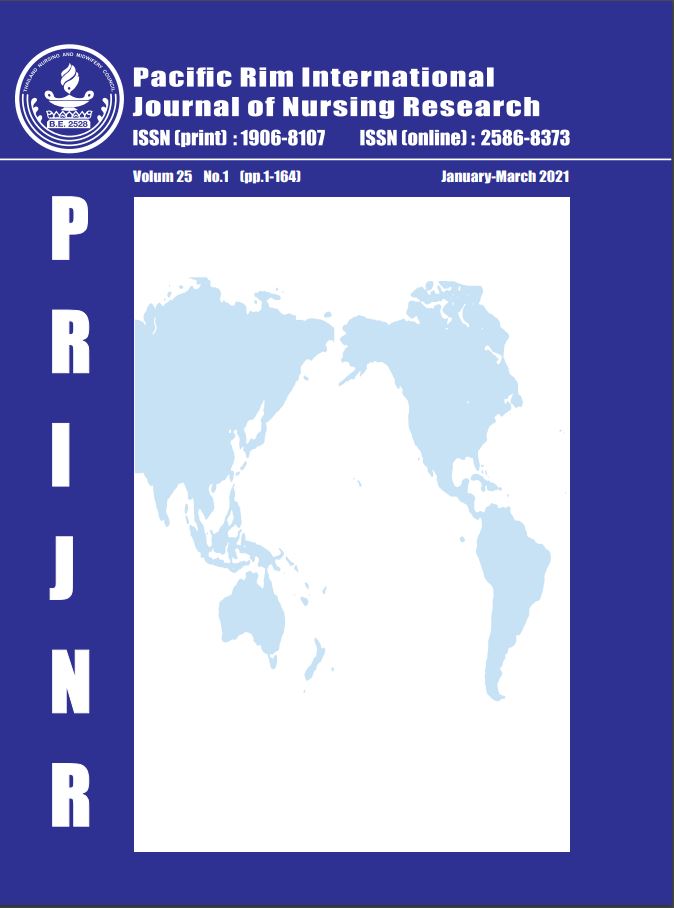Experiences of Communicating with Older Adults with Alzheimer’s Disease: A Phenomenological Study of Family Caregivers
Keywords:
Alzheimer’s disease, Communication, Family caregivers, Older adults, Qualitative research, Phenomenology, Thematic analysisAbstract
Communication allows people to make sense of the world, for people to connect, establish, maintain and change relationships. The declining communicative abilities of older adults with Alzheimer’s disease, however, may affect the quality of life of both caregivers and older adults. This study aimed to explore and better understand the lived experiences of family caregivers in communicating with older adults with this disease. An interpretative phenomenological approach was conducted in the province of Songkhla, Thailand between November 2018 to June 2019. Ten family caregivers were selected by purposeful sampling. Open-ended, semi-structured interviews were conducted. Interviews were audiotaped, transcribed verbatim and analyzed using thematic analysis. Two main themes were identified that represented areas of communication: engaging in troublesome communication; and inability to relate to each other. Effective communication strategies and techniques to improve communication problems were identified such as showing respect, compliance, distraction and therapeutic lies. After understanding the findings of this study, nurse practitioners and nurses need to understand the importance of assessing and analyzing the communication issues between caregivers and their older relatives.
Our findings can be a basis for planning and developing appropriate supports to enhance communication skill of the family caregivers within the context of daily communication with older adults with Alzheimer’s disease.
References
National Joint Committee for the Communicative Needs of Persons with SevereDisabilities. Guidelines for meeting the communication needs of persons with severe disabilities. ASHA. 1992;34:1-8.
Brady CN, Bruce S, Goldman A, Erickson K, Mine B, Ogletree BT, Paul D, Romski MA, Sercik R, Schoonover J, Snell M, Sylvester L, Wilkinson K. Communication services and supports for individuals with severe disabilities:guidance for assessment and intervention. Am J Intellect Dev Disbi. 2016; 121:121-38. doi: 10.1352/1944-7558-121.2.121.
Banovic S, Zunic JL, Sinanovic O. Communication difficulties as a result of dementia. Mater Sociomed. 2018; 30:221-4.
Guendouzi J, Savage M. Alzheimer’s dementia. In: Cummings L, editor. Research in clinical pragmatics. Cham,Switzerland.: Springer International Publishing.; 2017.
Watson BJ. Communication and Burden in Dementia Care. International Journal of Healthcare. 2018; 4:5-15. doi:10.5430/ijh.v4n1p5
El Hag M, Jardri R, Laroi F, Antoine P. Hallucination, loneliness, and social isolation in Alzheimer’s disease.
Cogn Neuropsychiatry. 2016; 21:1-13.
Windle G, Algar-Skaife K, Caulfield M, Pickering-Jones L, Killick J, Zeilig H, Tischler V. Enhancing communication between dementia care staff and their residents: an artsinspired intervention. Aging Ment Health.2019; 18:1-10 doi:10.1080/13607863.2019.1590310
Thwaites S. Enhancing caregiver’s communication skills: Teepa Snow’s positive approach to careTM(PACTM) and GEMS. TM In James AI, Gibbon L. Communication skills for effective dementia care: a practical guide to communication and interaction training (CAIT). London: Jessica Kingsley Publishers.; 2019. pp 89-107.
Alzheimer’s Association. Alzheimer’s disease facts and figures. Alzheimers Dement. 2017; 13:325-73.
Spencer E. The use of deception in interpersonal communication with Alzheimer’s disease patients. The Midwest quarterly.2017; 58:176-94.
World Health Organization. Dementia: key facts [cited 2020 July 14]. Available from https://www.who.int/news-room/fact-sheets/detail/dementia
Prasartkul P. Situation of the Thai Elderly 2016. Bangkok: Printery; 2017. pp.43
PistonoA, Jucla M, Bezy C, Lemesle B, Le Men J, Pariente J. Discourse macrolinguistic impairment as a marker of linguistic and extralinguistic functions decline in early Alzheimer’s disease. Int J Lang Commun Discord. 2019; 54:390-400.
Kindell J, Keady J, Sage K, Wilkinson R. Everyday conversation in dementia: a review of the literature to inform research and practice. Int J Lang Commun Disord. 2017; 52:392-406. doi: 10.1111/1460-6984.12298
Ondee P, Panitrat R, Pongthavornkamol K, Senanarong V, Harvath TA, Nittayasudhi D. Factors predicting depression among caregivers of persons with dementia. PRIJNR. 2013;17:167-80.
Persons LS. The way Thais lead: face as social capital. Bangkok: Silkworm Books; 2016.
Wisesrith W, Soonthornchaiya R, Sasat S, Sakunphani T. Care Service Model for Dependent Older Persons in Long-Term Care Institution in Thailand. Journal of The Royal Thai Army Nurses. 2019; 20:422-31. (in Thai).
The Secretariat of the Senate. Synthesis of caring for the elderly in Thailand: problem and suggestions. Bangkok: the National Legislative Assembly; 2016.
Gadamer H-G. Truth and Method. New York: Continuum Publishing Company; 1993.
Van Manen M. Researching lived experience: human science for an action sensitive pedagogy. 2nd ed. London: Alt House Press;1997.
Lave J, Kvale S. What is anthropological research? An interview with Jean Lave by Steinar Kvale. Qualitative Studies in Education. 1995: 8(3); 219-228.
Train the Brain Forum Committee. Thai mental state examination (TMSE). Siriraj Hosp Gaz. 1993; 45: 661-674.
Tasko SM. Neural substrate of speech and voice. In: Andreatta RD, editor. Neuroscience fundamentals for communication sciences and disorders. San Diego, CA.: Plural Publishing.;2019.p. 531-4.
Bayles K, McCullough K, Tomeda C. Cognitive-communication disorders of MCI and dementia. definition, assessment, and clinical management. 3rd ed. San Diego, CA.: Plural Publishing.; 2020.
Wang J, Hsieh P, Wang C. Long-term care nurses’ communication difficulties with people living with dementia in Taiwan. Asian Nurs Res. 2013; 7:99-103.
Szaltoczki G, Hoffmann I, Vincze V, Kalman J, Pakaski M. Speaking in Alzheimer disease, is that an early sign? Importance of changes in language abilities in Alzheimer’s disease. Front Aging Neurosci. 2015; 7:195. doi:10.3389/fnagi.2015.00195
Klimova B, Maresova P, Valis M, Hort J, Kuca K. Alzheimer’s disease and language impairments: social
intervention and medical treatment. Clin Interv Aging. 2015; 10:1401-8. doi: 10.2147/CIA.S89714.
Rockwood K. Exploration of verbal repetition in people with dementia using an online symptom-tracking tool. Int Psychogeriatr. 2017; 29:959-66. doi: 10.1017/S1041610216002180.
Stanyon MR, Griffiths A, Thomas SA, Gordon AL. The facilitators of communication with people withdementia in a care setting: an interview study with healthcare workers. Age Ageing. 2016; 45:164-70. doi:10.1093/aging/afv161.
Downloads
Published
How to Cite
Issue
Section
License
Copyright: The Pacific Rim International Journal of Nursing Research, Thailand Nursing & Midwifery Council has exclusive rights to publish, reproduce and distribute the manuscript and all contents therein.








.png)



